Public Library’s Effort To Empower The Borneo Community
This title (paper) has been presented at International Knowledge virtual Conference 2021 (IKC2021) organised by Pustaka Negeri Sarawak. The paper was prepared by Dwi Fitrina Cahyaningtyas and Ida F. Priyanto from Graduate School of Library and Information Management Gadjah Mada University, Indonesia.
Abstract
Introduction: Muara Teweh is the capital of North Barito Regency in Central Borneo which is surrounded by a river. This regency has public library that has been the center for lifelong learning, in order to improve the community’s education and social activities. In doing so, the librarians do activities in the library and an outreach program and approach the communities, that include teachers, housewives, students, and health workers.
Methods: this is a qualitative study conducted by unstructured interviews with Borneo’s librarians in Muara Teweh Public Library.
Result: The Public library has empowered the community by way of inviting the community to the library to take part in the library program and the librarians also visit the community to the outreach programs. The programs are held by the librarians include workshop series writing, cooking, sewing, and mentoring classes at the rural libraries. The activities were attended by many people from various circles such as the community in general, students, teachers, and health workers. The community felt enthusiastic to participate in the activities because they got talents from joining the activities from the library. The community reacted positively with the idea.
Conclusion: Empowerment efforts can be done by creating a climate that allows the community’s potentials to thrive. The library can be a place where the community develop their talents together with the librarians. This collaboration between the community and the librarians is an example of Borneo’s way of developing their people.
Keywords: public library, outreach program, community development, SDGs, Borneo
Introduction
Borneo is located north of Java, west of Sulawesi and east of Sumatra, 26% of the island is the Malaysian territory of Sabah and Sarawak and 1% is in the State of Brunei. It is an island geographically divided into three countries: Malaysia and Brunei in the northern part of the island, and Indonesia to the south (Marchetti, 1998). The island is also the third-largest island in the world after Greenland and New Guinea. Seventy three percent of the island is the Indonesian territory (Encyclopaedia Britannica).
Borneo is home to one of the oldest rainforests in the world. It is Covered in the dense rainforest. Borneo boasts some of the world’s most diverse flora and fauna, including Rafflesia arnoldi, the largest monster flower in the world and the rainforest is one of the few remaining natural habitats for the endangered Bornean orangutan.
The population consists mainly of Dayak ethnic groups, Malay, Banjar, Orang Ulu, Chinese and Kadazan-Dusun. It is located especially in the central and southern region of Borneo, each with its own dialect, customs, laws, territory, and culture, although common distinguishing traits are easily identified. The Dayak people category is mostly limited among the ethnic groups traditionally concentrated in the southern region of Sarawak and Kalimantan (wikepedia, 2021).
The Dayak tribe is a nickname for the inhabitants of the region of Borneo Island who inhabit there. Brunei, Malaysia (which consists of Sabah and Sarawak), and Indonesia which consists of West Kalimantan, East Kalimantan, Central Kalimantan, North Kalimantan, and South Kalimantan.
Indonesia constitutes the largest geographical component of the island (in Indonesian known as Kalimantan), its territory is divided into five provinces, namely Central Kalimantan, East Kalimantan, North Kalimantan, South Kalimantan, and West Kalimantan.
Libraries and Pandemics: Past and Present
Before Covid-19 (Coronavirus) pandemic hit in Wuhan-China, Spanish Flu was found for the first time in the Camp Funston, Kansas, United States in 1918 (Spinney, 2018). At the time many libraries were temporarily closed, and some libraries had existing policies for dealing with materials and quarantined patrons. The same thing is also happening right now, in which it is important to apply health measures such as social distancing and closing public gathering spaces. In fact, the 1918 flu pandemic was the first in which libraries were central to disseminate public health information. This new library role in educating the public was a shift and made libraries as partners in many public awareness campaigns of health.
Meanwhile before the outbreak anyone can visit a library. Studying, watching movie, playing, enjoying leisure time and many others can be done in a library. Librarians have many activities to serve their users. Users can learn everything, from finding out how to do new things, following the adventures of fictional and real-life heroes, and even solving mysteries and finding the answer to burning questions. When children and their families visit the a library, they can learn various lifelong skills, many of which will be helpful at home, at school, and in their community.
The Covid-19 outbreak has a global impact. During the pandemic right now, wearing a mask is mandattory in public spaces, including libraries. Libraries around the world are facing hard choices around which services to offer and how, either it's half-open or fully closed. Libraries have quickly shifted their focus to protect public health, limiting programs while still getting materials for readers, who demand books while they are stuck at home and working from home.
In Indonesia, many library services are provided online during covid-19 and the libraries also hold programs such as webinar, workshop, and user education. Currently the libraries have two kinds of services; half open which means that users are allowed to visit the library with limitation of time and seats. Meanwhile the fully closed libraries mean users can only pick up and return books. Since the pandemic hit last year, some libraries are still closed until now, and some others are half open by applying health measures and limiting the number of visitors. The libraries have applied new policies and rules, such as waiver of fines and open drive-thru services and books delivery. With this serviceS, it is easier for libraries to fulfill the information needs. These services definitely minimize the crowds in the public services. With the presence of these services, it is very effective for libraries to meet the users’ needs because it is fast, easy, and efficient. Besides, libraries also develop other services, such as creating digital navigator programs to support digital literacy, launching more online programs, and making use of outdoor spaces— to show the possibilities of transformation and partnership.
Methodology
This is a qualitative study conducted by interviewing librarians through a zoom meeting with unstructured interviews were chosen. The study is located in the Public Library of Muara Teweh, in which Muara Teweh is the capital of North Barito Regency in Central Borneo.
Result and Discussion
The result covers library activities, the community, social inclusion, outreach program, and librarian barriers.
PerpuSeru and Social Inclusion
In recent years, social inclusion has caught the attention of people in various professions around the world. Bill & Melinda Gates Foundation is one of the organizations involved in such inclusion. The foundation invited Coca-Cola Foundation Indonesia to hold programs called PerpuSeru . With the support of the Bill & Melinda Gates Foundation, PerpuSeru develops public libraries to develop communities by transforming libraries into learning centers that provide information technology-based and social inclusion-based library services. It has a real impact on improving people's welfare through strengthening literacy. It is in accordance with the government’s program through the National Library to carry out social inclusion by providing a literacy culture and various training skills for the communities.
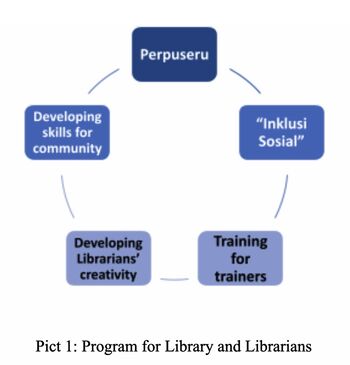
In the PerpuSeru programs there is a training for trainers. This training is attended by librarians from public libraries in Indonesia. PerpuSeru has spread across 18 provinces. There are 104 district libraries and more than 1,000 village libraries that have had an economic and social impact on the community (cocacola.co.id). This training provides skills for librarians who will interact with the communities. The PerpuSeru management expects the librarians to be able to share their knowledge, experience and skills to the communities either in the library or outside of the library which is usually called outreach program.
Designing Outreach and Social Inclusion Program
Libraries are no longer a place just for borrowing books, it’s also a place where the community can access e-resources, make use of Wi-Fi, work with computers, occupy meeting rooms, make use of art spaces, and hold activities for diverse child, youth, and adult. In the public libraries the users are the community with various professions. Public libraries collaborate with the local authorities and private institution to provide better services for the community. Public libraries are community hubs that provide access to information. They offer a safe space for social interaction, digital connection, lifelong learning, and rich cultural experiences regardless of their social or economic interests. Meanwhile in order to implement the PerpuSeru program, the librarians design activities to give inspirations through libraries that can change the communities to be productive. Librarians hold various events by inviting community to come to the library to attend various events such as training, for example ICT basic training, handicraft making, cooking class, sewing class, beauty class and writing class. Most trainings are free for everyone to join.
The events increase the number of library visitors because the visitors feel that they get benefit including their skills after they attend the training and other activities. As a goal to get closer to the community, the librarian invites the community to improve skills in the library.
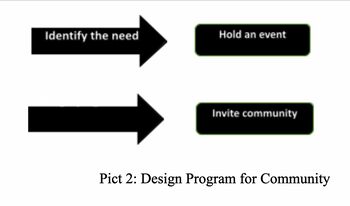
In addition to have routine programs, the librarians also identify what the communities’ needs are. Based on the survey by librarians, they hold events for the communities by way of trainings that give much benefit for the communities. The teachers ask the librarians to hold an ICT training in order for them to get certified, because the teachers must be able to operate some application/software.
Meanwhile in the outreach program the librarians visit schools in the rural areas besides visiting the community themselves. The limited number of collection and little increase in collection development means that the library is unable to fulfill the demand of the users (Priyanto, 2006). Unfortunatately there are not many books for students in the school libraries, so the mobile libraries bring books to help students to read. In addition, the librarians also do supervision for librarians in the rural public libraries.
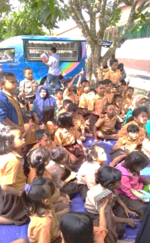
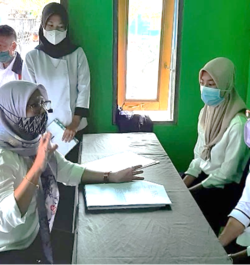
Pict 3: Outreach Program and Supervision Libraries the Rurals Areas
The Barriers
Although the librarians are enthusiastic in doing the outreach and other social inclusion programs, the librarians also face some barriers:
A. Burecratyc issue: Oftentimes the middle managers are reluctant to accept the librarian’s idea to hold social inclusion and outreach programs and this may result-in cancellation to realize the idea; therefore, the librarians usually talk to director and the director tells the middle managers to realize the program proposed by the librarians. Therefore, sometimes top-bottom instructions are more efficient than bottom-up.
B. Rural areas in Borneo are not easy for the librarians to visit because the roads are often muddy especially in the raining season and it is far to go from one village to another.
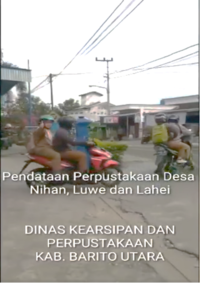
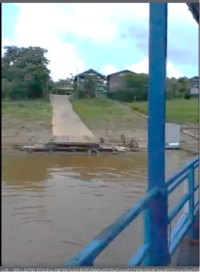
Pict 4: Outreach Program in the Rurals Areas
Librarians have transformed the communities through various activities after they get training form PerpuSeru program. Meanwhile the community can get skills and knowledge from the librarian and the public libraries. Social inclusion is a good practice for public libraries.
Conclusion
PerpuSeru is a useful project for developing libraries and the skills of librarians in order to bring libraries get closer to the community. Through social inclusion, the librarians help for the communities to develop by the libraians’ sharing knowledge, experiences, and skills. Librarians are enthusiastic and creative to empower the community through social inclusion and the community get real benefit.
References
- American Library Association. 2016. “Outreach Librarian", Retrieved from http://www.ala.org/educationcareers/libcareers/jobs/outreach
- Donna Marchetti (2 August 1998). "Borneo's Wild Side". The New York Times. p. 10. Retrieved from https://www.nytimes.com/1998/08/02/travel/borneo-s-wild-side.html
- Priyanto, I. 2006. “Getting closer to customers: the mushrooming of Alternative libraries in Yogyakarta, Indonesia”. World Library and Information Congress: 72nd IFLA General Conference and Council. Retrieved from https://origin-archive.ifla.org/IV/ifla72/papers/081-Priyanto-en.pdf
- Spinney, Laura (2018). Pale rider: the Spanish flu of 1918 and how it changed the world. Vintage.p. 36.
- Coca-Cola. 2018. PerpuSeru Ciptakan Dampak Perubahan Kemandirian Ekonomi hingga Lapangan Pekerjaan Retrieved from https://www.cocacola.co.id/cerita/perpuseru-ciptakan-dampak-perubahan-kemandirian-ekonomi-hingga-lapangan-pekerjaan